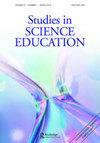Identifying precursory concepts in evolution during early childhood – a systematic literature review
IF 9.9
2区 教育学
Q1 EDUCATION & EDUCATIONAL RESEARCH
引用次数: 9
Abstract
ABSTRACT Difficulties in understanding evolution are often rooted in early childhood, arising from naïve assumptions and cognitive biases. However, literature reviews mainly focus on school and university students’ understanding of evolution, with only limited comprehensive reviews on children in early childhood aged up to 7 years. This systematic review aims to capture precursory concepts in evolution and influencing cognitive biases as documented in the empirical literature. Searches of three databases identified 204 articles, of which 26 were used for further analyses after screening for eligibility. The analyses revealed that even young children are capable of understanding the basic mechanisms of core concepts in evolution, such as variation, inheritance, and natural selection. However, while children’s understanding of the inheritance concept has been investigated intensively, their understanding of variation lacks in-depth research despite its probable influence on natural selection. Existing evidence is contradictory concerning the usefulness of children’s cognitive biases for learning core concepts in evolution: These can serve as stepping stones for learning evolutionary principles, but their usefulness is questioned if children have already developed scientifically correct explanations. More research is clearly needed concerning the reciprocal effects of children’s precursory core concepts in evolution in order to develop effective learning interventions for children.识别儿童早期进化的先兆概念-系统的文献综述
理解进化的困难往往源于儿童早期,源于天真的假设和认知偏见。然而,文献综述主要集中在中小学生和大学生对进化的理解上,对7岁以下儿童的全面综述有限。这篇系统综述旨在捕捉经验文献中记载的进化和影响认知偏见的前兆概念。对三个数据库的搜索确定了204篇文章,其中26篇用于资格筛选后的进一步分析。分析表明,即使是年幼的孩子也能够理解进化中核心概念的基本机制,如变异、遗传和自然选择。然而,尽管人们对儿童对遗传概念的理解进行了深入的调查,但他们对变异的理解缺乏深入的研究,尽管变异可能会对自然选择产生影响。关于儿童的认知偏见对学习进化中的核心概念的有用性,现有证据是矛盾的:这些偏见可以作为学习进化原理的垫脚石,但如果儿童已经形成了科学正确的解释,它们的有用性就会受到质疑。显然需要更多的研究来了解儿童早期核心概念在进化中的相互影响,以便为儿童制定有效的学习干预措施。
本文章由计算机程序翻译,如有差异,请以英文原文为准。
求助全文
约1分钟内获得全文
求助全文
来源期刊

Studies in Science Education
EDUCATION, SCIENTIFIC DISCIPLINES-
CiteScore
15.30
自引率
2.00%
发文量
7
审稿时长
>12 weeks
期刊介绍:
The central aim of Studies in Science Education is to publish review articles of the highest quality which provide analytical syntheses of research into key topics and issues in science education. In addressing this aim, the Editor and Editorial Advisory Board, are guided by a commitment to:
maintaining and developing the highest standards of scholarship associated with the journal;
publishing articles from as wide a range of authors as possible, in relation both to professional background and country of origin;
publishing articles which serve both to consolidate and reflect upon existing fields of study and to promote new areas for research activity.
Studies in Science Education will be of interest to all those involved in science education including: science education researchers, doctoral and masters students; science teachers at elementary, high school and university levels; science education policy makers; science education curriculum developers and text book writers.
Articles featured in Studies in Science Education have been made available either following invitation from the Editor or through potential contributors offering pieces. Given the substantial nature of the review articles, the Editor is willing to give informal feedback on the suitability of proposals though all contributions, whether invited or not, are subject to full peer review. A limited number of books of special interest and concern to those involved in science education are normally reviewed in each volume.
 求助内容:
求助内容: 应助结果提醒方式:
应助结果提醒方式:


